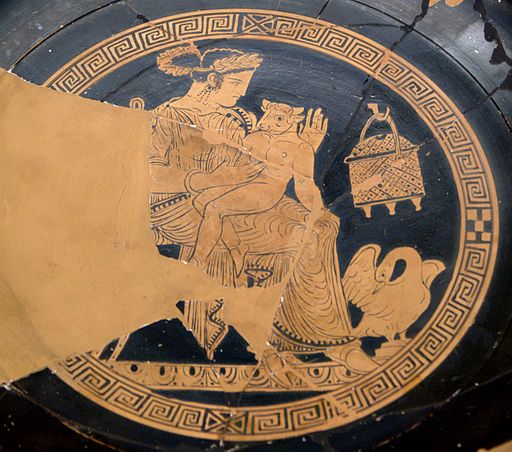So let's talk about a couple of other examples. The guys who don't make the cut.
Tantalus, King of ... well, no one can quite agree where. So let's say--
Tantalus, the Wealthy King
A son of Zeus by Pluto, herself a woman of heavily-ichored blood, Tantalus had a very close relationship to the gods. Some say that he was even invited into Zeus' confidences, and entrusted with divine secrets, which he then betrayed. Others say, he invited the Olympians to his house, and wanting to test them, he killed and cooked one of his sons, serving him to Zeus and the other gods for dinner. The stories say that Zeus, realizing what he had done, restored his son to life (missing a bit of his shoulder, as one of the more hapless gods had not been so discerning in regard to the menu) and cast Tantalus into eternal punishment in Tartarus. He was made to stand in a pool of water from which he could never drink (the water receding every time he bent to take a sip), with the boughs of fruit trees hanging over his head from which he could never eat (the branches pulled away out of reach when he stretched out his arm to grasp the fruit). The story of Tantalus the un-hero was so famous and so well known that we get the word "Tantalize" from his name.
Minos, King of Crete
 A son of Zeus by Europa, Minos is rarely categorized as a hero, and aside from the ever-present flaw of Hubris, he doesn't seem to have much in the way of Heroic characteristics. Like Tantalus before him, he takes advantage of his close ties and kinship with the gods, but doesn't show the proper amount of respect. When Minos asks the gods for a bull in order to take the crown, he's given the gift, but he doesn't follow through on his own promise to offer it back in sacrifice, and as a result, he's punished. And by "he" I mean, his pride more than anything, because it's his wife, Pasiphae who is struck with lust for the bull, and cuckolds him with the bovine -- likely Poseidon himself. As a result, she gives birth to the minotaur, a lasting reminder of Minos' error in judgment and a blight upon his house.
A son of Zeus by Europa, Minos is rarely categorized as a hero, and aside from the ever-present flaw of Hubris, he doesn't seem to have much in the way of Heroic characteristics. Like Tantalus before him, he takes advantage of his close ties and kinship with the gods, but doesn't show the proper amount of respect. When Minos asks the gods for a bull in order to take the crown, he's given the gift, but he doesn't follow through on his own promise to offer it back in sacrifice, and as a result, he's punished. And by "he" I mean, his pride more than anything, because it's his wife, Pasiphae who is struck with lust for the bull, and cuckolds him with the bovine -- likely Poseidon himself. As a result, she gives birth to the minotaur, a lasting reminder of Minos' error in judgment and a blight upon his house. It seems to me that the message of these two stories is clear. Divine Ichor or not, know your place. This is something the real heroes don't seem to have so much trouble with -- they know the gods are above them, and they act accordingly. When they DO overstep themselves, war or punishment follows swiftly. But these guys? Minos and Tantalus? Their errors are so grievous that if they accomplished anything heroic, it's been overshadowed forever by their wrongs.
You might say they're the Cautionary Tales of the ancient world.

No comments:
Post a Comment